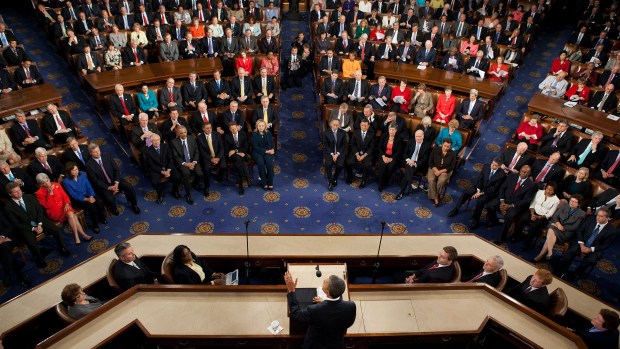The House reportedly likely to vote on a major infrastructure bill soon — and if it passes, it will have big consequences for the future of sustainable transportation in the U.S.
The Moving Forward Act is a massive, $1.5-trillion bill that will have sweeping implications for housing, climate change, water, and land use in addition to a particularly large impact to the way we approve and fund transportation at the federal level. Organizations like Smart Growth America are, rightly, applauding Congress for treating transportation as one thread in a tightly woven tapestry of foundational issues – but it also means that the aspects of the bill that are most urgent to transportation advocates won't receive a separate vote, and aren't getting a whole lot of press.
Streetsblog readers will probably be most interested in the INVEST Act portions of the bill — yes, it's an act within an act — which will replace the Fixing American Surface Transportation (FAST) Act that expires this year. Here are a few of the highlights:
States would get more money to end traffic violence
The INVEST Act would give traffic safety programs a little more attention — and a little more money.
In a sterling example of toothless government vague-speak, the bill would require "states with the highest levels of pedestrian and bicyclist fatalities to set aside funds to address these safety needs." Less vague, though, is the 30-percent boost for road safety funding, the 6o-percent boost for a program that builds bike lanes and sidewalks, and a provision that finally makes it illegal for states to set traffic fatality "targets" that are larger than the number of people who died on their roads the previous year.
There will be a lot of crucial debate about how these programs will holistically address all forms of street safety — and not just the safety hazards drivers cause — and even with hefty percentage increases, the funding for these programs will still be dwarfed by driver-focused spending. But having a little more money could be a very positive step.
DOTs would have to fix highways before they build new ones
Pretty much since the interstate highway system was invented, states have had enjoyed huge financial incentives to build new highways even if the ones they've already got are on the brink of collapse. Things have gotten so bad that Transportation for America estimates it would take $231.4 billion per year just to maintain the roads we have — far more than the $165 billion that was spent on highway construction and repair last year.
The INVEST Act will go a long way to stopping that by requiring states to focus on maintenance in order to be eligible for funds from the National Highway Performance Program, among others.
The INVEST Act doesn't make any provisions for tearing down roads that we never should have built in the first place, such as roadways from the urban renewal era that destroyed Black neighborhoods and still cause Black communities disproportionately horrific health outcomes to this day. But if it passes, at least states can't build more.
Congestion pricing could become a reality
Transportation advocates who care about creating opportunity for poor drivers and making sure that richer drivers pay their fair share to use our roads have been doing some truly transformative work around the concept congestion pricing — and the INVEST Act could give the hotly debated idea a serious leg up.
It won't be a tolling free-for-all, and there are some potentially restrictive guardrails around the policy shift such as requiring congestion tolls to undergo a rigorous full environmental impact statement rather than a shorter environmental assessment. But advocates are hopeful that the new bill sends a signal that this good idea's time has finally come — and might become a reality on highways across our country soon.
Transportation emissions would go down... due to more electric cars
The transportation sector is responsible for the largest share of U.S. climate change emissions, but politicians are loathe to work for real reform that could give Americans greener ways to get around than private cars. The INVEST Act could put more money into transit ... but it also addresses climate change by putting more money into the electric vehicle market. That's a problem for anyone who cares about the non-climate-related impacts of driving as our dominant transportation mode.
For instance, the INVEST Act would create a new $8.3-billion program to offset carbon pollution that states could use to build transit projects (good!) or stuff like electric vehicle charging infrastructure on highways (not so good, as Streetsblog has pointed out in a three-part series).
It also creates or maintains funding for a gaggle of discretionary grants and additional provisions that could be used to pay for either transit projects or highway projects. Suffice it to say, EV advocates support the bill ... and transit advocates have been mostly tepid or silent. This is one element of the bill to keep a close eye on.
—
The Democrat-controlled House is expected to pass the Moving Forward Act — and with it, the INVEST Act — with amendments, but its future is less certain once it goes to the Republican-controlled Senate, whose most recent infrastructure bill was not so progressive. Still, advocacy group Smart Growth America says the bill is not necessarily DOA — and encourages proponents to "Make sure [their] rep[s] know that the INVEST Act is Congress’ best chance to finally move the needle."
If you wish to call your Member of Congress, start by looking him or her up here.






